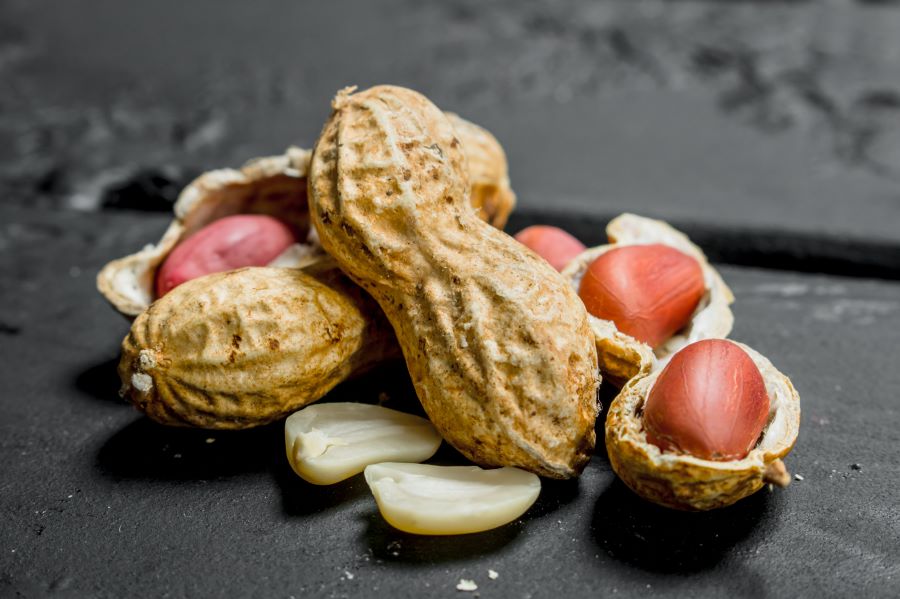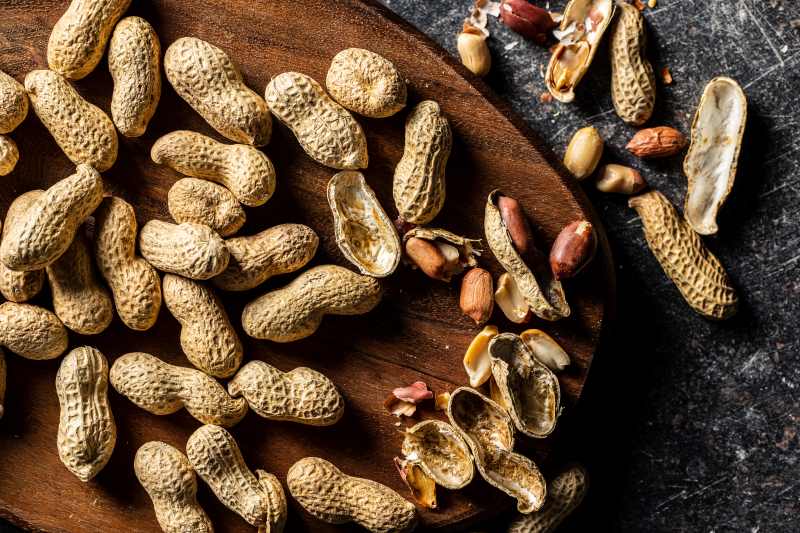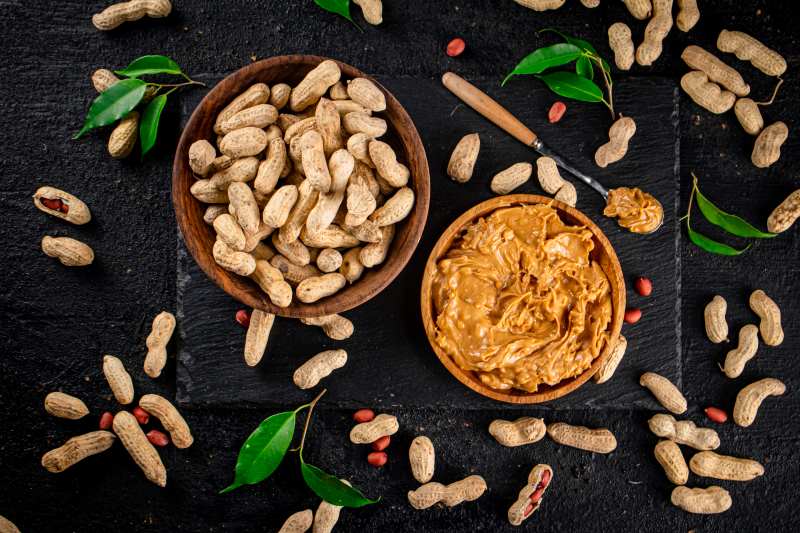15 Amazing Health Benefits of Peanuts

Peanuts are considered one of the healthiest foods, and surprisingly, it is not from the family of nuts. Rather, peanuts, like soybeans, green peas, and lentils, are classified as legumes. This legume originated in South America and is found in ample amounts in India.
However, if you are looking for health benefits, you might be surprised to know that the nutritional value of peanuts is equivalent to expensive nuts like walnuts, cashews or almonds.

Table of Contents

Top 15 Health Benefits of Peanuts

Most people believe that peanuts have lower nutritious value and often overlook them to include in their diet. But, here are the top reasons to include them in your diet.
1. Reduce the Risk of Cancer
Intake of peanuts in required has been linked with the benefit of reducing the risk of colorectal cancer. Peanuts contain an ample amount of resveratrol, phenolic acid, and isoflavones which are believed to have anti-cancer properties.
Besides this, as per a study, peanuts are found to reduce the risk of postmenopausal breast cancer. Also, peanuts can reduce the risk of gastric and oesophagal cancers. Finally, it is believed that one of the benefits of eating peanuts daily is that it reduces the risk of developing cancer.
2. Keep Heart Healthy
According to a study by the Harvard School of Public Health, it was found that peanuts can lower bad cholesterol levels (LDL) levels. Also, peanuts might protect against fatal coronary heart disease (CHD) and non-fatal myocardial infarction.
Besides this, the antioxidant property of resveratrol in peanuts shields against heart diseases and might also have other cardioprotective effects. Furthermore, as stated by a study by Purdue University, consumption of peanuts regularly can lower triglycerides, boosting heart health. Finally, peanuts are believed to increase the level of good cholesterol and are supported by another study conducted by National Library of Medicine.
3. Prevent Gallstones
As a study by Harvard Medical School and Brigham and Women's Hospital (Boston), peanuts lower the risk of gallstones. In addition, men and women consuming five or more units of nuts (including peanuts) for 7 days are believed to lower the risk of gallstones and cholecystectomy, respectively.
4. Help Treating Erectile Dysfunction
One of the advantages of peanuts is that they can potentially cure erectile dysfunction. This is because these are rich in arginine, which contains amino acids, and arginine has been studied extensively as a possible cure for erectile dysfunction. However, a few studies have shown that oral consumption of amino acids with pycnogenol can also treat erectile dysfunction.
5. Can Protect Against Alzheimer’s Disease
Peanuts are a rich source of niacin that can possibly provide protection against age-related cognitive decline and Alzheimer’s disease. Also, these are a great source of Vitamin E, which is also believed to protect against Alzheimer's disease.
6. Help in Control Blood Sugar
Adding peanuts to your daily diet might help to reduce the risk of a spike in blood sugar levels. This is because peanuts have a GI (glycemic index) of 14, whereas the GL (glycemic load) is 1. Hence, it makes a diabetes superfood, and the fibre in it helps lower blood sugar levels. It also contains healthy oils and magnesium, which is also beneficial for the same.
7. Can Reduce Symptoms of Polycystic Ovarian Syndrome (PCOS)
Adding peanut butter to your Polycystic Ovarian Syndrome (PCOS) diet will provide more fibre and calories that reduce the inflammatory condition of this disorder. Peanuts are rich in monounsaturated fats, and some research has shown that a diet containing them improves the metabolic profile of females with PCOS.
8. Can Promote Hair Health
Although the research in this regard is exiguous, peanuts are believed to promote hair health. This is because peanuts have plenty of proteins and amino acids which act as a good supplement for hair health.
9. Promote the Health of Skin
Consuming peanuts regularly can provide sun protection against sunburn and damage. A few components of peanuts, such as zinc, magnesium and Vitamin E, can fight bacteria to promote skin glow. Additionally, beta-carotene found in peanuts is also believed to improve skin health.
10. Can Boost Energy
Peanuts are a rich source of fibre and protein that helps in the generation of energy from carbohydrates. Also, the fibre and protein content of peanuts might allow the steady release of energy into the body.
11. Help Reduce Inflammation
The fibre content of peanuts reduces inflammation within the body and promotes good gut health. The compounds work by neutralising free radicals and reducing oxidative stress, major contributors to inflammation. Regular consumption of peanuts has been linked to lower levels of inflammatory markers.
12. Can Aid Weight Loss
Peanuts are densely packed with energy, and they can be consumed as a snack that provides a sense of fullness. So, consuming it regularly can promote weight loss and might also help in weight control.
13. Rich in Vitamins
Peanuts are an excellent source of essential vitamins, including vitamins E and B, like niacin, folate, and biotin. Vitamin E acts as a powerful antioxidant, protecting cells from damage. B vitamins support energy production and brain health, while folate is crucial for DNA synthesis and repair.
14. Improves Skin Health
The nutrients in peanuts, such as vitamin E, biotin, and healthy fats, contribute to better skin health. Vitamin E protects the skin from oxidative damage and premature ageing. Biotin supports skin barrier function, helping to maintain hydration and elasticity.
15. Mental Health Support
Peanuts contain several nutrients that support mental health, including niacin, folate, and healthy fats. Niacin (vitamin B3) is vital for brain function and can help improve cognitive function and reduce the risk of neurodegenerative diseases. Folate plays a role in neurotransmitter synthesis, crucial for mood regulation.
What are the Nutritional Values of Peanuts?
The nutritional components provide multiple health benefits of peanuts, and per 100 gm of raw peanuts contains the following nutrition:
Check Other Important Health Metrics Now
How to Include Peanuts in Your Daily Diet?

There are myriad ways to consume peanuts daily to get its nutritional benefits. To get the most nutrition, you can have it raw, and if you don't like its taste, you can sprinkle some salt on it. Besides this, other ways to consume peanuts are:
1. Toss Peanuts in your Salad
Adding peanuts to your salad can enhance its nutritional value and add a delightful crunch. Peanuts provide healthy fats, protein, and fibre, making your salad more satisfying. Simply sprinkle a handful of roasted or raw peanuts over your greens.
2. Have Them as an Afternoon Snack
Peanuts make a perfect afternoon snack due to their high protein and healthy fat content. They can keep you full and energised until your next meal. A small serving of peanuts can curb cravings and provide essential nutrients.
3. Consume as Peanut Butter
Peanut butter is a versatile way to include peanuts in your diet. Spread it on whole-grain toast for a nutritious breakfast or snack. It can also be added to smoothies, oatmeal, or yoghurt for extra flavour and protein.
4. Make Dessert and Sweets Out of It
Peanuts can be used to create a variety of delicious desserts and sweets. Incorporate them into cookies, brownies, or homemade granola bars for added crunch and flavour. They can also be used in traditional dishes like peanut brittle or halva.
5. Add to Smoothies
Blend a tablespoon of peanut butter or a handful of peanuts into your morning smoothie. This addition provides a creamy texture and boosts the protein content, making your smoothie more filling and nutritious.
6. Peanut-based Sauces
Use peanuts to create flavorful sauces for your dishes, such as a peanut satay sauce or peanut dressing. These sauces can be drizzled over grilled meats, vegetables, or noodles to enhance the taste and nutritional value of your meals.
What are the Side Effects of Overeating Peanuts?
Although consuming peanuts is a great way to add comprehensive nutrition to your diet, eating too much of it can be harmful. Some of the most common risks associated with the overconsumption of peanuts are:
- Can Promote Weight Gain: Peanuts are high in calories and fat. Overeating can lead to excessive caloric intake. This, combined with a sedentary lifestyle, can contribute to weight gain. Regular consumption in moderation is essential to avoid unwanted weight increases. Managing portion sizes helps maintain a healthy weight.
- May Promote Incorrect Omega Fatty Acid Balance: Peanuts contain omega-6 fatty acids but lack sufficient omega-3 fatty acids. Excessive consumption can disturb the balance between these two types of fatty acids. An imbalance may lead to inflammation and other health issues. A diet balanced with omega-3-rich foods is necessary. Proper balance is crucial for overall health.
- Has Potential Danger of Mould Contamination: Peanuts are susceptible to mould growth, especially when stored improperly. Mould can produce aflatoxins, which are harmful and potentially carcinogenic. Consuming aflatoxin-contaminated peanuts may lead to serious health problems. Ensuring peanuts are stored in a cool, dry place can reduce this risk. Regular inspection and quality checks are advisable.
- Can Increase Blood Pressure: Peanuts contain sodium, especially when salted or processed. Excessive sodium intake is linked to high blood pressure. Overeating peanuts can contribute to elevated blood pressure levels. Opting for unsalted peanuts can mitigate this risk. Monitoring sodium intake is important for cardiovascular health.
- May Inhibit Mineral Absorption: Peanuts contain phytic acid, which can bind minerals such as iron, zinc, and calcium. This binding can inhibit the absorption of these essential minerals. Overconsumption of peanuts might lead to deficiencies in these nutrients. Balancing peanut intake with other mineral-rich foods is beneficial. Proper nutrient absorption is crucial for overall health.
- Can Cause Mineral Deficiency: Due to the presence of phytic acid, excessive peanut consumption can lead to deficiencies in important minerals. This can affect bone health, immune function, and overall well-being. A varied diet, including other sources of minerals, can help prevent such deficiencies. Ensuring a balanced intake of various foods is essential for nutrient adequacy.
- Nutrient Imbalance: While peanuts are nutritious, overeating can disrupt nutrient balance. High intake of peanuts might lead to excessive consumption of certain nutrients like fats and proteins while displacing other essential nutrients from the diet.
- Heartburn and Acid Reflux: Eating too many peanuts, speciated or spicy ones spicy, can exacerbate heartburn and acid reflux. The high-fat content in peanuts can relax the lower esophageal sphincter, leading to acid reflux and discomfort.
- Increased Cholesterol Levels: Peanuts are high in fats, but most are healthy unsaturated fats. However, consuming them in excess can still impact cholesterol levels by increasing the intake of fats, potentially affecting heart health negatively.
- Headaches: Overconsumption of peanuts can lead to headaches in some individuals. This could be due to the high-fat content or the presence of compounds like tyramine, which may trigger headaches in sensitive people.
- Gastrointestinal Discomfort: Eating too many peanuts can cause gastrointestinal discomfort, including nausea and diarrhoea. The combination of large amounts of fibre, fat, and proteins can overwhelm the digestive system and lead to digestive distress.
Who Should Avoid Eating Peanuts?
Besides the ample benefits of eating peanuts, individuals should be aware while consuming them.
- Individuals with Peanut Allergies: People who are allergic to them should avoid consuming, and a few of the symptoms of allergic reaction to peanuts are runny nose, skin itching, tingling in the mouth and throat, diarrhoea, vomiting or nausea, etc.
- Individuals with High Blood Pressure: If you have high blood pressure, it will be beneficial to avoid peanuts, as an increase in sodium intake can be harmful. People with hypertension should limit peanut intake.
- People with High Cholesterol: Individuals with elevated cholesterol levels should be cautious with peanut consumption, as the high-fat content can contribute to increased cholesterol if eaten in excess.
- People with Digestive Disorders: Those with digestive conditions such as irritable bowel syndrome (IBS) or Crohn’s disease should avoid peanuts to prevent exacerbation of symptoms like bloating and gas.
- Those with Kidney Stones: Individuals prone to kidney stones should avoid peanuts due to their high oxalate content, which can contribute to stone formation and exacerbate kidney issues.
- Those with Acid Reflux: People suffering from acid reflux or heartburn should avoid peanuts, which can relax the lower oesophagal sphincter and worsen symptoms. Even small amounts can trigger symptoms.
Hence, it is evident that the nutritional value of peanuts is undeniably valuable for health. Also, the consumption of peanuts is especially beneficial for people with low weight as it helps maintain a good weight for overall well-being. Moreover, apart from raw groundnuts, you can also consume cold-pressed groundnut oil, which is rich in Vitamin E and Omega-6 fatty acids.
Protect What Matters - Explore Other Insurance Options














